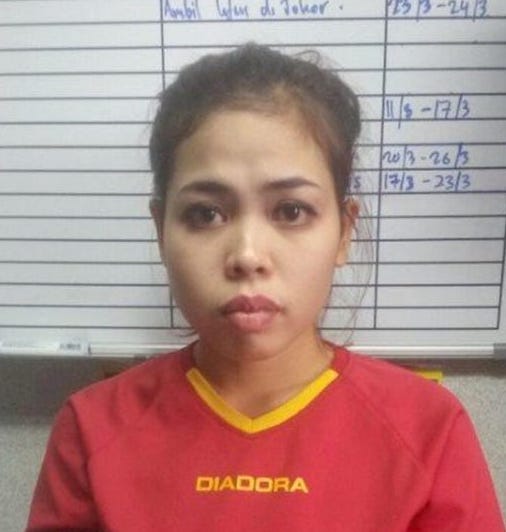SUNDANCE INTERVIEW: “Assassins” is ripe for a series, it’s got so many twists and turns (director Ryan White)
Park City, Ut. – To even describe it seems ludicrous: recruit two young women, who think they will be part of a hidden-camera prank show, to inadvertently assassinate Kim Jong-nam, the dissident half-brother of North Korean dictator Kim Jong-un.
In an airport. In broad daylight. With hundreds of witnesses and cameras recording it all.
This isn’t the plot for a spy thriller, but rather the real-life story recounted in director Ryan White’s documentary, “Assassins.” In the Kuala Lumpur airport on Feb. 13, 2017, Siti Aisyah and Đoàn Thị Hương were captured on airport camera smearing VX poison gas on Kim’s face—which they falsely believed was a prank. Kim died within an hour, and the two women were put on trial for their lives.
“Assassins” begins with the horrifying surveillance video, and then takes a number of bizarre twists and turns over a gripping ninety minutes.
Director Ryan White (“Ask Dr. Ruth”) described “Assassins,” which premiered at Sundance this week, as a three-act play.
“The first third, it looks like these women are cold-blooded, diabolical, ruthless trained assassins. And then [in] the second third…you find out what their defense is, which is the most bizarre, mind-boggling twist ever in a true-crime story,” White told me. “And then a third act where these women are on trial and it looks like they’re going to be executed.”
White, who is based in Los Angeles, estimates he made fifteen trips to Asian to film “Assassins,” inclusive of covering the trial in Malaysia and also interviewing the family of Aisyah in Indonesia and Huong’s family in Vietnam.
“Both of these families live in villages, so it’s not like you [go from] your hotel room in the city to” their homes, White said. “You’re [then] five hours away from a city hoping they will [agree to be interviewed]. Thankfully they did. I know both families pretty well now because we went to each village three or four times.”
White said he came to the absurd story through the writings of Doug Bock Clark in “GQ.” Clark was able to introduce White to various sources, and he even came aboard “Assassins” as an executive producer.
“I think access is probably key to almost any documentary,” White said. “There are so many different groups of people in the film: journalists, lawyers, families who might lose their daughters. So every strategy or way to try to get them to participate was different.”
The trip from Los Angeles to location often took 31 hours each way—inclusive of “losing” a day traveling from America. White says he once even flew all that way for all of 14 hours on the ground before returning home again.
“What was really hard about that was we were following a trial, so if the lawyers said, ‘Hey, tomorrow this is going to happen,’ I literally could not get there in time,” White said. “I needed at least two days’ notice. I was very lucky that I would get tipped off to things that might happen so I could be there for the critical junctures of the trial.”
“Assassins” makes the case that not only were the women put up to the murder under false pretenses, but that their North Korean “handlers” were able to escape scot-free back to Pyongyang, where the regime would almost certainly keep them from justice. Given how Kim Jong-un’s cyber forces hacked into Sony’s computers after it released “The Interview,” a comedy that showed Kim’s “death,” I asked White if he was at all concerned for his safety.
“We had security consulting come in and engineer a whole system for how we were going to make this film. We didn’t make it naively,” he said. “We tried to take every precaution that we would not get hacked or our film wouldn’t get leaked.
“I won’t say there haven’t been scary moments. Even when you think you’re communicating with someone, you wonder if it’s not even that person anymore” but an imposter, he said.
However, White feels that if there is any “immunity” to “Assassins,” it is that it treats Kim’s trajectory with even-handed reportage versus the slapstick of “The Interview.”
“This man played it very smart in his gradual rise to power. And [‘Assassins’] looks centrally at the role this assassination plays in his grasping power,” said White.
Furthermore, White says that Kim’s agents could have assassinated Kim Jong-nam anywhere. They specifically chose a public place like the Kuala Lumpur airport to show the world that no one, not even Kim’s own half-brother, was safe from his wrath.
“I feel the regime created this spectacle for a reason, and my film shows the spectacle that frankly they got away with,” said White. “This was contrived in a way that was supposed to gain attention. The women [claim] they thought they were on a reality show. They did it in a foreign country with foreign passports, so they created an international incident.”
White believes it’s a boomtime for documentaries, and says he’s been approached by people in the industry and without who saw his earlier multipart doc series, “The Keepers.” When asked if he ever thought “Assassins” could be have multiple chapters as well, he said his backers would have certainly gone for it, but he ultimately felt the story of “Assassins” was better told in less than two hours.
“To create a series you have to create three acts within every one-hour episode,” White said. “And it felt like we would be contriving or sensationalizing the story too much to do that.
“We met with a lot of distributors [where] that would be their first question. Because it’s ripe for a series. It’s got so many twists and turns.”
“Assassins” was picked up Friday by Magnolia for worldwide distribution.

news via inbox
Nulla turp dis cursus. Integer liberos euismod pretium faucibua



